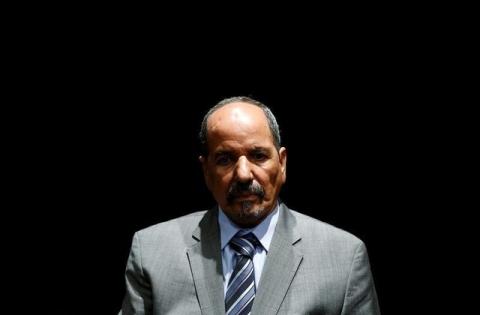Advertisement
Leader of Western Sahara independence movement dies after illness
ALGIERS (Reuters) - The long-standing leader of Western Sahara's independence movement, Mohamed Abdelaziz, died on Tuesday after more three decades of war and diplomatic struggle for the disputed territory with Morocco.
Abdelaziz, 68, the Polisario Front's secretary general and president of its self-declared Sahrawi Republic, had suffered from a long illness, the movement's Sahara Press Service and Algeria's state news agency said.
His death came at a sensitive time for the Western Sahara dispute. Morocco earlier this year expelled part of a United Nations peace-keeping mission from the territory following a disagreement with U.N. Secretary General Ban Ki-moon.
Ban's press office issued a statement expressing his sadness at the death of Abdelaziz, whom he met earlier this year during a visit to the region.
"Mr. Abdelaziz was a central figure in the search for a resolution of the Western Sahara conflict," the statement said.
Morocco took over most of the territory in 1975 from colonial power Spain, but the Polisario Front began a guerrilla war for Abdelaziz's Sahrawi people, saying the desert region in northwest Africa belonged to them.
Polisario has been based in Algeria since a U.N. ceasefire in 1991 halted the conflict. But a dispute over a referendum on the area's future has left it in a deadlock for years.
Algeria's government declared eight days of mourning after Abdelaziz's death was announced. Polisario rules state that the movement's assembly president takes over for 40 days after which an extraordinary session will be held to choose a new leader.
Abdelaziz, who lived in the Sahrawi refugee camp in southern Algeria, had led the Polisario though a period of struggle and into the U.N.-backed truce. Since 1991, the dispute has been frozen over how to hold the referendum.
Many younger Sahrawi are demanding progress after years in the camps in the Tindouf region of Algeria, exerting a pressure that the Polisario's new leadership will have to manage.
Polisario representatives say Morocco put the ceasefire at risk by expelling U.N. staffers and trying to scuttle the referendum, including on the question of independence. Morocco has offered an autonomy plan as the only way forward.
The U.N. statement said Ban wanted to help the parties "to achieve a mutually acceptable political solution, which will provide for the self-determination of the people of Western Sahara."
During his recent visit to the region, Ban infuriated Morocco by referring publicly to the "occupation" of Western Sahara.
(Reporting by Patrick Markey; Additional reporting by Louis Charbonneau in New York; Editing by Gareth Jones and Leslie Adler)



















Add new comment